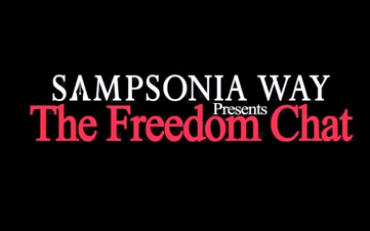The Freedom Chat Transcripts: Turkmenistan Journalist Anna Soltan
by Sampsonia Way / September 16, 2014 / No comments

The Freedom Chat is an ongoing video series by Sampsonia Way featuring interviews with journalists and other media workers facing censorship and repression in their home countries. In these Q&A’s, conducted via video chat, journalists talk with Sampsonia Way about press freedom, anti-free speech legislation, and exile.
In the eleventh installment of The Freedom Chat, the interview had to be conducted entirely by email to protect the subject’s identity. Anna Soltan is the pseudonym of the editor of Turkmen news at neweurasia.net. In this interview, Soltan speaks about the state of censorship in Turkmenistan, the challenges of producing online media in her country, and the challenges faced by Turkmen bloggers.
During an interview with Sampsonia Way in 2011, you spoke to Turkmenistan’s heightened level of censorship and Internet restrictions. Have the Turkmen government’s official policies on censorship changed in the past three years? Have actual conditions for Turkmen journalists improved, worsened, or stayed the same?
The Turkmenistan government’s official policies on censorship haven’t changed. [Conditions for journalists] have stayed the same.
What prompted Turkmenistan’s 2013 media law, which ostensibly granted freedom of the media? Given that Turkmenistan still ranks at the bottom of the World Press Freedom Index, has the law resulted in any actual benefits for Turkmen journalists?
I can’t detect any particular motivation except for a possible attempt [towards] improving the reputation of Turkmenistan on the international stage, although the situation remains the same with the media in Turkmenistan. Still, it seems there is at least a feeling about making some positive changes or the impression of it.
How do Turkmenistan’s media restrictions compare to the state of press freedom in other former Soviet Republics in Central Asia?
Turkmenistan’s media censorship can in some ways be compared to Uzbekistan, although in several media reports Turkmenistan’s is listed as the worst in Central Asia.
How did the 2012 reelection of Gurbanguly Berdimuhamedow affect Turkmenistan’s media repression? As Berdimuhamedow enters his seventh year in office, how would you and your colleagues describe his legacy?
The media situation remains unchanged.
Could you speak to the challenges of producing online media in regards to Turkmenistan’s limited access to the Internet?
Any website or chat forum publishing stuff [that is directly critical] of the government risks being censored, attacked, or closed down. Therefore, for the Turkmen journalists the options are either to work for the state media or to blog about music, football, cooking and other hobbies for fun – i.e. all non-political things – because it safe to do that.
Neweurasia features the work of citizen bloggers across Turkmenistan. Could you describe the challenges faced by Turkmen bloggers? Additionally, as an experienced activist and journalist, what cautions or encouragements would you give to a Turkmen citizen considering work as an independent journalist?
I would like to see more Turkmen bloggers and blogging. I believe that people should not be shy about writing [about] the things they see in daily life, about their thoughts and fears. Even if they cannot write about big topics, they can help people and be useful to people with some advice and by displaying how to do things with something they have learned or found out, for example. Because free media is a new concept for our society, and good education is seen as very important, the Turkmen people really appreciate such a service. That’s also a way of informing, and one that would really work. So the thing is to find ways in which journalism [can] start developing within the limits of what’s allowed. We have to be innovative in finding ways to bring journalism into [motion] because it is a living thing.
What precautions are taken by Turkmenistan’s independent journalists?
The use of pseudonyms is widespread. They are careful to discuss topics only with people who they know. Identities can easily be disclosed. Because of fear of a negative reaction they often resort to self-censorship and investigative journalism is a mostly taboo field. Also, people usually write for a certain period and that’s it. It’s hard to keep it going as a reporter or writer because the person gets too much attention at once. It is simply unusual to write something. People mostly prefer to comment rather than write articles.
What motivated you to begin work as an independent journalist? How has your attitude towards your activism and writing changed over time?
My motivation for becoming an independent journalist was to address and try some new topics that had not been addressed so far, to inform the people in different ways, [and] to experiment with new reporting styles in journalism that I had learned as a journalism student. [I wanted to] see how the people would react and to learn more about the public opinion, directly and objectively and not from third sources. My motivation has not a political nature but rather to inform and entertain.




